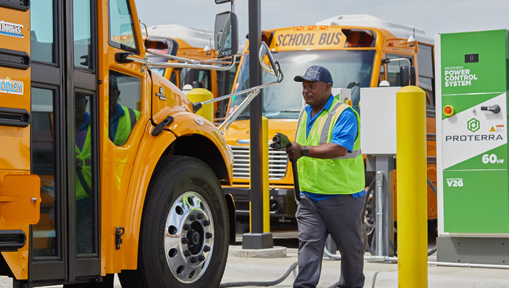WHY ELECTRIC TRANSPORTATION VEHICLES?
BECAUSE TOMORROW HAS NEVER BEEN MORE IMPORTANT.
It’s no secret that electric transportation vehicles are built to make tomorrow cleaner, greener and brighter. But they’re also designed with innovations to make todays’ transportation needs more efficient—and even safer.
HOEKSTRA TRANSPORTATION, YOUR TRUSTED PARTNER IN EV INTEGRATION.
Electric Bus Development
Partnering with bus manufacturers to offer new electric bus options for today’s transportation needs, like the new Saf-T-Liner C2 Jouley Electric School Bus vehicle for schools. The development of electric buses marks a significant milestone in the transportation industry’s journey towards sustainability. As school districts worldwide grapple with the challenges of air pollution and climate change, electric buses offer a promising solution to reduce emissions and improve urban air quality. These buses are powered by clean energy sources, such as electricity from renewable sources like solar and wind, eliminating harmful tailpipe emissions associated with traditional diesel buses. Moreover, advancements in battery technology have led to improved range, efficiency, and charging infrastructure, making electric buses a viable and cost-effective alternative for public transit systems. With growing support from governments, transit agencies, school districts and environmental advocates, electric bus development continues to accelerate, paving the way for cleaner, quieter, and more sustainable urban transportation systems for generations to come.
Electric Route Assessment
Electric route assessment plays a pivotal role in the transition to school transportation systems. It involves evaluating various factors to determine the feasibility and effectiveness of introducing electric buses on specific routes within a school districts. Factors considered include route distance, passenger demand, infrastructure availability, and charging capabilities. By conducting a thorough assessment, school districts can identify routes that are suitable for electric bus deployment, maximizing the environmental and economic benefits while minimizing operational challenges. Additionally, route assessment helps prioritize investments in charging infrastructure and supports the integration of electric buses into existing transit networks seamlessly. As schools worldwide strive to reduce greenhouse gas emissions and improve air quality, electric route assessment emerges as a crucial step towards achieving these ambitious sustainability goals in school transportation.
Economic Feasibility
The economic feasibility of incorporating electric vehicles (EVs) into a fleet is a multifaceted consideration that encompasses various factors. While the initial investment in EVs may be higher compared to traditional internal combustion engine vehicles, long-term cost savings can often offset these upfront expenses. Factors contributing to the economic feasibility include reduced fuel and maintenance costs, as EVs typically have lower operating expenses and require less frequent maintenance due to fewer moving parts. Additionally, incentives such as tax credits, rebates, and subsidies offered by governments and utility companies can further offset the purchase price of EVs and charging infrastructure. Moreover, as battery technology advances and production scales up, the cost of EVs is expected to continue decreasing, making them even more economically attractive over time. When evaluating the economic feasibility of adding EVs to a fleet, it’s essential to consider not only the direct costs but also the long-term benefits, including reduced emissions, improved air quality, and enhanced corporate sustainability initiatives.
Financial Services
When purchasing electric vehicles (EVs), accessing financial services tailored to support the transition to electric transportation can significantly ease the financial burden and incentivize adoption. These services encompass various aspects, including funding, grant writing assistance, vehicle and battery leasing programs, and utility rebate programs. Funding sources, such as government grants and incentives, provide financial assistance to offset the higher initial costs associated with EVs. Additionally, grant writing assistance services can aid individuals and organizations in navigating the application process and securing funding opportunities effectively. Vehicle and battery leasing programs offer alternative ownership models, allowing consumers to access EVs without the upfront costs associated with purchasing. Furthermore, utility rebate programs incentivize EV adoption by offering financial incentives or credits for charging infrastructure installation and EV purchases. Together, these financial services play a crucial role in promoting the widespread adoption of EVs, making them more accessible and affordable for consumers while advancing sustainability goals and reducing reliance on fossil fuels.
Charging Infrastructure Deployment
The deployment of charging infrastructure is a critical component of the transition to electric vehicles (EVs) and the advancement of sustainable transportation systems. As the demand for EVs continues to grow, the availability of convenient and reliable charging stations becomes increasingly important. Charging infrastructure deployment involves strategically installing charging stations in key locations such as urban centers, workplaces, residential areas, and along major highways to support EV drivers’ needs. For school districts, charging infrastructure planning for their depots will be an integral part of the EV Ecosystem. Schools must plan in ahead for the types of chargers they will need to suffice their routes. This infrastructure expansion not only addresses range anxiety concerns but also encourages EV adoption by providing drivers with convenient access to charging options. Furthermore, deploying charging infrastructure plays a vital role in fostering economic growth, creating job opportunities, and driving innovation in the clean energy sector. Collaboration between government agencies, utilities, businesses, and other stakeholders is essential to accelerate the deployment of charging infrastructure and build a robust charging network that supports the widespread adoption of EVs, ultimately contributing to a more sustainable and environmentally friendly transportation future.
Maintenance and Operations
Maintenance and operations for electric vehicles (EVs) require specialized training, tools, and processes to ensure optimal performance, safety, and longevity. Driver training is essential to familiarize operators with the unique characteristics of EVs, including range limitations, charging procedures, and regenerative braking systems. Additionally, technician training is crucial to equip service professionals with the skills and knowledge necessary to diagnose, repair, and maintain EVs effectively. This includes training on high-voltage (HV) systems, battery management, and specialized diagnostic equipment.
A comprehensive parts stocking list is essential to ensure prompt repairs and minimize vehicle downtime. This list should include common replacement parts such as batteries, electric motors, charging connectors, and cooling system components. Additionally, specialized tools and equipment are required for EV maintenance, including insulated gloves, voltage testers, and battery handling equipment.
Technicians must undergo HV training to safely work on EVs and handle high-voltage components. This training covers safety procedures, risk assessment, and emergency response protocols to mitigate the risks associated with HV systems.
Overall, effective maintenance and operations for EVs require a proactive approach, ongoing training, and a well-equipped service infrastructure to support the growing demand for electric transportation. By investing in training, stocking essential parts, and ensuring compliance with safety standards, organizations can maximize the reliability, efficiency, and longevity of their EV fleets while promoting a sustainable future.
Fleet Management
Effective EV fleet management involves the integration of cutting-edge technologies to ensure optimal performance and sustainability. Central to this approach is sophisticated charging software, which orchestrates the charging process to minimize downtime and maximize efficiency. This software not only schedules charging times but also monitors energy consumption, facilitating cost-effective operations. Additionally, vehicle monitoring systems, such as Zonar, play a crucial role by tracking battery range and vehicle efficiency in real-time. By leveraging data analytics, fleet managers can make informed decisions regarding route planning, maintenance schedules, and driver behavior, ultimately enhancing overall performance and reducing operational costs. Moreover, these technologies enable proactive measures to address potential issues before they escalate, ensuring seamless operations and promoting the widespread adoption of electric vehicles in fleets.
End of Life Service
End-of-life service for electric vehicles (EVs) is a crucial aspect of sustainable transportation management, encompassing several key elements to ensure responsible stewardship of resources and minimize environmental impact. Battery replacement is a fundamental consideration as EV batteries naturally degrade over time and usage. To maintain vehicle performance and longevity, efficient and accessible battery replacement services are essential, enabling EV owners to transition seamlessly to new battery packs while responsibly managing the disposal of old ones.
Battery disposal is equally significant, requiring proper handling to mitigate environmental risks and optimize resource recovery. Recycling facilities play a vital role in extracting valuable materials from spent batteries, facilitating their reuse in new battery production or other applications. This closed-loop approach minimizes waste and conserves resources, aligning with principles of circular economy and sustainable resource management.
Moreover, the repurposing of EV batteries for a second use life presents an innovative solution to extend their utility beyond initial vehicle usage. Retired EV batteries often retain substantial storage capacity, making them ideal candidates for energy storage applications. Whether integrated into grid stabilization systems, renewable energy storage projects, or stationary backup power solutions, repurposed EV batteries contribute to a more resilient and sustainable energy infrastructure while maximizing the value of these valuable resources.
In summary, end-of-life service for electric vehicles encompasses battery replacement, disposal, and repurposing, each playing a vital role in ensuring the long-term sustainability of EVs and their associated technologies. By adopting holistic approaches to end-of-life management, we can maximize resource efficiency, minimize waste, and pave the way for a cleaner, more sustainable transportation future.
Zero emissions and maximum efficiency.
Transportation vehicles make millions of trips per year. That’s a lot of miles and carbon output—and a huge opportunity. Investing in zero-emission vans and buses could drastically reduce harmful emissions. Plus, their predicable routes make them the perfect vehicle for scheduling charges each day.
A quieter ride. And as safe as ever.
Electric transportation vehicles provide a smoother, quieter ride than fossil fuel-powered buses with many built on already road-proven chassis. These not only provide a better driving and riding experience, but also create a safer environment for passengers and drivers.
Reduced Total Cost of Ownership.
Powering transportation vehicles with electricity costs less than using diesel, propane, gasoline, or compressed natural gas. Plus, there’s minimized costs associated with vehicle maintenance with predictive and real-time vehicle diagnostics for fleet managers.

Accelerating the transition to clean transportation.
Clean Fuels Michigan brings together stakeholders from across the clean transportation industry to show a unified voice for the industry. We are committed to advancing clean transportation in Michigan.
Current EV Vehicles
Begin Your Electric Journey
We’re here when you’re ready to add electric vehicles to your fleet! Partner with Hoekstra Transportation for a consultative approach to purchasing your new electric vehicle. We’ll guide you through the most frequently asked questions, customization options, as well as leasing and fleet solutions to help you make the most informed choice.
Recent News















 HOEKSTRA FAMILY OF COMPANIES
HOEKSTRA FAMILY OF COMPANIES

